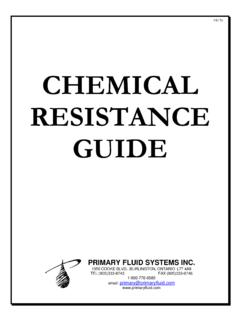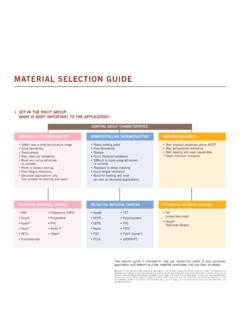Transcription of Makrolon 2405,2407,2458 for PDF
1 Makrolon 2405,2407, and 2458 polycarbonate Resins2405 General-Purpose, High-Productivity Grade2407 General-Purpose, High-Productivity, UV-Stabilized Grade2458 General-Purpose, High-Productivity, FDA-Quality GradeAlthough small parts offer some of the more attractivebenefits of increased productivity, these grades are alsocandidates for applications involving large injectionmolded parts. In both large and small part molding,the same processing allowances exist. Lower melttemperatures and easy release permit demolding withless time necessary for stabilizing the 2458 resin complies with FDA food-contactregulations 21 CFR ( polycarbonate Resins)and may be used in contact with all food types. Mostcolors may be used for all thermal food-contactapplications. However, some colors are limited byConditions of Use B, 21 CFR and may not be used when the food is sterilized in thefood-contact article under autoclaving contact your Bayer Corporation representativewith complete details when food contact is 2458 resin, in natural 000000 and clear tints550042 and 550115, is also listed under NSF standard51 for use in food equipment.
2 Please consult your BayerCorporation representative for more information aboutfood equipment 2405, 2407, and 2458 resins are utilized overa wide range of applications in a variety of market applications include automotive light pipes,clear windows for business machines and instruments,and numerous consumer applications where multicavitytooling is used. As with any product, use of Makrolon2405, 2407, or 2458 resin in a given application mustbe tested (including but not limited to field testing) inadvance by the user to determine 2405, 2407, and 2458 polycarbonate resins arelinear, low-viscosity, high-performance thermoplasticsproduced in pellet form for processing primarily byinjection molding. A unique technology enables thesepolycarbonates to maintain mechanical properties similarto lower-melt-flow grades of standard polycarbonate ,while offering improved flowability for increaseddesign flexibility. Makrolon 2407 resin is three resins contain an internal mold release are available in natural clear, clear tints, andtransparent, translucent, and opaque colors, and withspecial visual broadening the processing window, Makrolon2405, 2407, and 2458 resins are designed to permitfaster cycling and higher productivity.
3 Based upon testsconducted at Bayer laboratories, a processing comparisonof Makrolon 2405 polycarbonate resin with productionruns of standard polycarbonate has demonstratedincreases in production rates in excess of 15%. Actualtest results may vary, depending on the applicationand processing conditions. In addition, the increasedproductivity reduces energy consumption on a unitpart benefits are the result of low melt viscosity andease of part ejection. The low viscosity is of particularinterest in applications where thin walls exist or theflow length-to-wall thickness is high. Ease of processingat lower temperatures translates to faster cycles, as partsmay be produced at lower mold-set-point temperaturesand ejected after shorter cooling times. Althoughapplicable to existing tools, new tool design can takeadvantage of the low melt viscosity of these runners and distribution systems can beemployed to minimize regrind and reduce cycle sections in the part can be reduced to conservematerials and contribute faster InformationPage 1 of 6 Document contains important information and must be read in its ApplicationsMakrolon 2458 resin is used in a variety of : Certain color formulations ofMakrolon 2458 polycarbonate resin (such as clear tint550115) meet the requirements of the FDA-modifiedISO 10993, Part 1 Biological Evaluation of MedicalDevices tests with human tissue contact time of 30days or less.
4 Only products that meet these require-ments may be considered candidates for applicationsrequiring must not be used in medical applicationsrequiring s Responsibility: It is the responsibilityof the medical device, biological product or pharma-ceutical manufacturer ( Manufacturer ) to determinethe suitability of all component parts and raw materials,including Makrolon 2458 resin, used in its final productin order to ensure safety and compliance with FDArequirements. This determination must include, asapplicable, testing for suitability as an implant deviceand suitability as to contact with and/or storage ofhuman tissue and liquids including, without limitation,medication, blood or other bodily fluids. Under nocircumstances may Makrolon 2458 resin be used inany cosmetic, reconstructive or reproductive implantapplications. Nor may Makrolon 2458 resin be used inany other bodily implant applications or any applicationsinvolving contact with or storage of human tissue, blood,or other bodily fluids for greater than 30 days, basedon FDA-modified ISO 10993, Part 1 BiologicalEvaluation of Medical Devices suitability of a Bayer product in a given end-useenvironment is dependent upon various conditionsincluding, without limitation, chemical compatibility,temperature, part design, sterilization method, residualstresses, and external loads.
5 It is the responsibility ofthe Manufacturer to evaluate its final product underactual end-use requirements and to adequately adviseand warn purchasers and users medical devices made from a Bayer productare not suitable for multiple uses. If the medical deviceis designed for multiple uses, it is the responsibility ofthe Manufacturer to determine the appropriate numberof permissible uses by evaluating the device under actualsterilization and end-use conditions and to adequatelyadvise and warn purchasers and users : Parts molded from Makrolon 2458 resinare sterilizable using radiation, ethylene oxide, or steamautoclaving. When sterilizing with steam, germicidesand detergents must be rinsed thoroughly from polycar-bonate parts prior to autoclaving. Failure to thoroughlyremove germicides and detergents from the part priorto autoclaving may cause accelerated degradation ofthe sterilization temperatures for parts made ofMakrolon polycarbonate must not exceed 250 F(121 C) to avoid part deformation.
6 Please note thatpermanent immersion of polycarbonate parts in waterabove 140 F (60 C) or in steam causes loss of materialproperties and must be avoided. Furthermore, condensedsteam should not be allowed to accumulate, as thismay cause damage to parts. polycarbonate parts shouldalso be protected from damage by substances such asalkaline corrosion inhibitors, which are frequentlyadded to boiler feed sterilization method and the number of sterilizationcycles a medical device made from Makrolon 2458resin can withstand will vary depending upon type/grade of product, part design, processing parameters,sterilization temperature, and chemical , the Manufacturer must evaluate each deviceto determine the sterilization method and the numberof permissible sterilization cycles appropriate foractual end-use requirements and must adequatelyadvise and warn purchasers and users polycarbonate resins are hygroscopic and mustbe thoroughly dried prior to processing. A desiccantdehumidifying hopper dryer is recommended.
7 Toachieve a moisture content of less than , hopperinlet air temperature should be 250 F (121 C) andinlet air dew point should be -20 F (-29 C) or hopper capacity should be sufficient to providea minimum residence time of 4 hours. Additionalinformation on drying procedures is available in theBayer brochure General Drying 2 of 6 Document contains important information and must be read in its resins may be easily processed oncommercially available molding equipment suitable forinjection molding of polycarbonate . Barrel temperaturesmay be reduced by up to 45 F (25 C) below normalprocessing conditions for standard polycarbonate dueto ease of cavity fill. Lower viscosity also means thatlower primary and secondary injection pressures maybe used and that molded-in stresses should be lower melt temperature permits the use of shorterhold and cure times. The shorter molding cycle iscomplemented by ease of part ejection at high processing parameters are noted below.
8 Actualprocessing conditions will depend on machine size,mold design, material residence time, shot size, information on processing may be obtainedby consulting the Bayer publication Makrolon Polycar-bonate A Processing Guide for Injection Moldingand by contacting a Bayer MaterialScience technicalservice InformationWhere end-use requirements permit, up to 20% Makrolon resin regrind may be used with virginmaterial, provided that the material is kept free ofcontamination and is properly dried (see section onDrying). Any regrind used must be generated fromproperly molded parts, sprues, and/or runners. Allregrind used must be clean, uncontaminated, andthoroughly blended with virgin resin prior to dryingand processing. Under no circumstances shoulddegraded, discolored, or contaminated material beused for regrind. Materials of this type should beproperly mixed and/or dried regrind may diminishthe desired properties of Makrolon resin. It is criticalthat you test finished parts produced with any amountof regrind to ensure that your end-use performancerequirements are fully met.
9 Regulatory or testingorganizations ( , UL) may have specific requirementslimiting the allowable amount of regrind. Becausethird party regrind generally does not have a traceableheat history or offer any assurance that propertemperatures, conditions, and/or materials were usedin processing, extreme caution must be exercised inbuying and using regrind from third use of regrind material should be avoided entirelyin those applications where resin properties equivalentto virgin material are required, including but notlimited to color quality, impact strength, resin purity,and/or load-bearing Compliance InformationSome of the end uses of the products described in thisbulletin must comply with applicable regulations, suchas FDA, NSF, USDA, and CPSC. If you have anyquestions on the regulatory status of these products,contact your Bayer MaterialScience representative orBayer s Regulatory Affairs Manager in Pittsburgh, Injection Molding ConditionsBarrel Temperatures:Rear.
10 445 495 F (229 257 C)Middle .. 510 550 F (266 288 C) 530 570 F (277 299 C) 510 530 F (266 277 C)Melt Temperature .. 535 565 F (279 296 C)Mold Temperature .. 150 220 F (66 104 C)Injection Pressure .. 10,000 20,000 psiHold Pressure .. 50 70% of Injection PressureBack Pressure .. 50 100 psiScrew Speed .. 50 75 rpmInjection Speed .. Moderate to FastCushion .. 1/8 1/4 3 5 ton/in2 Page 3 of 6 Document contains important information and must be read in its Characteristics of PolycarbonateHydrolytic Stability. Parts molded from polycarbonateabsorb only to water at room temperatureand 50% relative humidity. Dimensional stability andmechanical properties remain virtually unaffected. Evenwith immersion in water, dimensional changes measureonly about Although frequent, intermittent contactwith hot water does not harm polycarbonate , continuousexposure to humidity or water at high temperatures(>140 F/60 C) is not recommended due to hydrolyticdegradation, which reduces impact strength andtensile Permeability.








